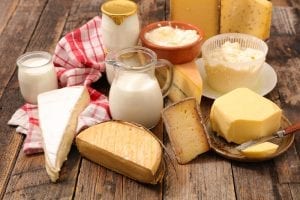The consumption of dairy products could impact a woman’s fertility levels. Research has found a possible link between dairy products and a woman’s ability to conceive naturally or through IVF.
The Definition of Dairy Products
When many people think of dairy products, items such as milk and ice cream often come to mind. While these items are among the more common dairy foods and beverages, dairy is considered to be any product produced from the milk of mammals like cows or goats. Other well-known and frequently consumed items include cheese, yogurt, and butter.
The Connection Between Dairy Products and Fertility

Scientific Studies
Research has found that the consumption of dairy products containing high concentrations of calcium can positively impact not only the natural conception process, but artificial insemination as well. Researchers representing the Harvard University School of Public Health, supported by the National Institute of Health, examined the impact dairy product consumption exerted on women aged 35 and older who were struggling with infertility and undergoing in-vitro fertilization (IVF) treatments.
More than 200 examinees were studied. Prior to beginning the test, the examiners assessed the diet of each of the participants. They then examined critical statistics such as ovarian stimulation, the thickness and strength of specific reproductive organs, and the embryo quality of the subjects while they were undergoing IVF cycles.
The researchers discovered that subjects aged 25 and older experienced a significant increase in carrying IVF-induced pregnancies full-term and witnessing live births. While researchers are not yet ready to claim an increased dairy intake is a cure for infertility, they believe that, if executed in moderation, an increased dairy intake will not hurt the chances of conception, refuting prior beliefs that dairy consumption could prove detrimental to the conception process.
Moderation Is Key
Regardless of these findings, members of the scientific and healthcare communities do caution would-be mothers to exercise caution in regulating dairy consumption. Though the food products can prove valuable in some ways, excessive dairy intake is thought by some to reduce the chance of successful conception.
Incorporating Dairy Products Into a Fertility-Based Diet
Most healthcare professionals and nutritionists opine that women will not harm their chances of conception by enjoying a glass of milk or eating cheese or yogurt from time to time. That said, individuals can obtain sufficient levels of calcium by consuming other foods such as fish (sardines and salmon), seeds (chia, poppy or sesame), legumes like beans, nuts (especially almonds), leafy green vegetables (kale, spinach and collard greens) and dried fruits (particularly figs).




